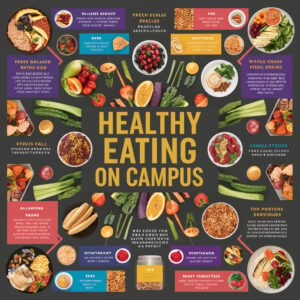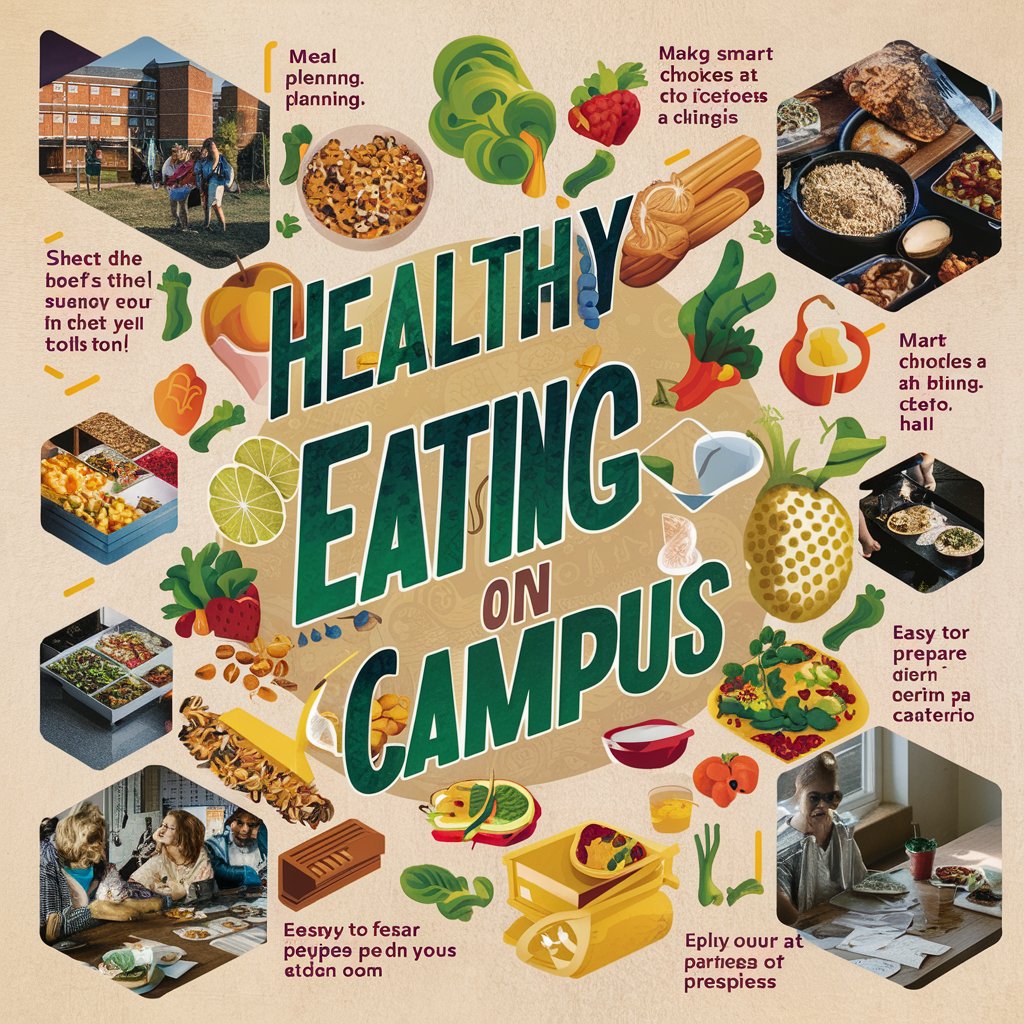
Introduction
Importance of Healthy Eating in College
Brief Overview of Article Content
Understanding the Challenges of Eating Healthy on Campus
Limited Time and Busy Schedules
Budget Constraints
Availability of Healthy Options
Planning and Preparing Meals
Importance of Meal Planning
Easy and Nutritious Meal Ideas
Using Campus Resources
Navigating the Dining Hall
Making Healthier Choices
Understanding Nutritional Information
Balancing Your Plate
Healthy Snacks for Busy Students
Quick and Easy Snack Ideas
Benefits of Healthy Snacking
Portable Snack Options
Staying Hydrated
Importance of Hydration
Healthy Beverage Choices
Tips for Drinking More Water
Eating on a Budget
Budget-Friendly Healthy Foods
Shopping Tips for Students
Utilizing Campus Food Programs
Managing Special Dietary Needs
Vegetarian and Vegan Options
Food Allergies and Intolerances
Seeking Support and Resources
Balancing Indulgence and Nutrition
Understanding Moderation
Enjoying Treats Without Guilt
Mindful Eating Practices
Cooking in Dorm Rooms
Essential Cooking Tools
Simple Dorm Room Recipes
Safety Tips for Cooking in Small Spaces
Using Campus Resources
Campus Nutrition Services
Fitness Centers and Wellness Programs
Student Health Services
Maintaining a Balanced Diet During Exams
Healthy Brain Foods
Meal Prep Tips for Exam Weeks
Stress-Relieving Foods
Building Healthy Eating Habits
Developing a Routine
Setting Realistic Goals
Tracking Your Progress
Getting Support from Friends and Roommates
Encouraging Healthy Choices
Sharing Meals and Recipes
Creating a Supportive Environment
Conclusion
Recap of Key Points
Encouragement to Prioritize Healthy Eating
FAQs
How can I eat healthy with a limited budget?
What are some quick and healthy snack ideas?
How do I stay motivated to eat healthy on campus?
What should I do if I have dietary restrictions?
How can I maintain healthy eating habits during stressful times?
Healthy Eating on Campus
Introduction
Eating healthy on campus can be a challenge with the busy schedules and limited budgets that college students often face. However, maintaining a nutritious diet is essential for your physical health, mental well-being, and academic performance. This article provides practical tips and resources to help you eat healthy while navigating college life.
Understanding the Challenges of Eating Healthy on Campus
College life brings unique challenges that can make healthy eating difficult.
Limited Time and Busy Schedules
With classes, assignments, and social activities, finding time to prepare and eat healthy meals can be tough.
Budget Constraints
Many students are on tight budgets, which can limit their ability to buy nutritious foods.
Availability of Healthy Options
Campus dining options may not always offer the healthiest choices, making it harder to stick to a nutritious diet.
Planning and Preparing Meals
Meal planning and preparation are key to eating healthy on campus.

Importance of Meal Planning
Planning your meals ahead of time can help you make healthier choices and save money.
Easy and Nutritious Meal Ideas
Opt for simple meals like salads, wraps, stir-fries, and smoothies that are easy to prepare and packed with nutrients.
Using Campus Resources
Take advantage of campus kitchens or communal cooking areas to prepare your meals.
Navigating the Dining Hall
Dining halls can be overwhelming, but with the right strategies, you can make healthier choices.
Making Healthier Choices
Look for lean proteins, whole grains, and plenty of fruits and vegetables. Avoid fried and overly processed foods.
Understanding Nutritional Information
Pay attention to nutritional information provided by the dining hall to make informed choices.
Balancing Your Plate
Aim to fill half your plate with fruits and vegetables, a quarter with protein, and a quarter with whole grains.
Healthy Snacks for Busy Students
Snacking can be a healthy part of your diet if you choose the right options.
Quick and Easy Snack Ideas
Stock up on nuts, yogurt, fruits, vegetables, and whole-grain crackers for quick and nutritious snacks.
Benefits of Healthy Snacking
Healthy snacks can keep your energy levels up and help you avoid overeating during meals.
Portable Snack Options
Choose snacks that are easy to carry with you, such as granola bars, trail mix, and fruit.
Staying Hydrated
Hydration is crucial for maintaining overall health and well-being.
Importance of Hydration
Proper hydration supports digestion, cognitive function, and physical performance.
Healthy Beverage Choices
Opt for water, herbal teas, and natural fruit juices. Limit sugary drinks and caffeinated beverages.
Tips for Drinking More Water
Carry a reusable water bottle and set reminders to drink water throughout the day.
Eating on a Budget
Healthy eating doesn’t have to be expensive.
Budget-Friendly Healthy Foods
Look for affordable healthy options like beans, lentils, eggs, oats, and frozen vegetables.
Shopping Tips for Students
Buy in bulk, look for sales, and choose store brands to save money on groceries.
Utilizing Campus Food Programs
Take advantage of campus food pantries or meal plans that offer healthy options.
Managing Special Dietary Needs
Navigating special dietary needs on campus requires planning and awareness.
Vegetarian and Vegan Options
Many campuses offer vegetarian and vegan options. Look for these in the dining hall or prepare your own meals.
Food Allergies and Intolerances
Communicate with dining hall staff about your dietary restrictions to ensure safe meal options.
Seeking Support and Resources
Join campus groups or online communities for students with similar dietary needs for support and tips.
Balancing Indulgence and Nutrition
It’s important to enjoy treats in moderation without feeling guilty.
Understanding Moderation
Allow yourself to enjoy your favorite treats occasionally while focusing on overall healthy eating.
Enjoying Treats Without Guilt
Savor treats mindfully and balance them with nutritious meals and snacks.
Mindful Eating Practices
Pay attention to your hunger and fullness cues to avoid overeating.
Cooking in Dorm Rooms
Cooking in a dorm room can be challenging but manageable with the right tools and recipes.
Essential Cooking Tools
Invest in a few key items like a microwave, mini-fridge, blender, and electric kettle.
Simple Dorm Room Recipes
Try no-cook or microwave-friendly recipes like overnight oats, salads, and microwaveable rice and vegetables.
Safety Tips for Cooking in Small Spaces
Always follow safety guidelines and be mindful of dorm rules regarding cooking appliances.
Using Campus Resources
Many campuses offer resources to support healthy eating.
Campus Nutrition Services
Seek advice from campus nutritionists or dietitians who can help you create a balanced meal plan.
Fitness Centers and Wellness Programs
Participate in fitness classes and wellness programs to complement your healthy eating habits.
Student Health Services
Use student health services for additional support and resources related to nutrition and well-being.
Maintaining a Balanced Diet During Exams
Stressful times like exams can disrupt healthy eating habits, but planning can help.
Healthy Brain Foods
Consume foods rich in omega-3 fatty acids, antioxidants, and vitamins like fish, nuts, berries, and leafy greens.
Meal Prep Tips for Exam Weeks
Prepare meals and snacks in advance to ensure you have nutritious options during busy study periods.
Stress-Relieving Foods
Incorporate foods that can help manage stress, such as dark chocolate, herbal teas, and whole grains.
Building Healthy Eating Habits
Developing healthy habits can make nutritious eating a sustainable part of your lifestyle.
Developing a Routine
Establish regular meal and snack times to maintain consistent energy levels.
Setting Realistic Goals
Set achievable goals for incorporating more healthy foods into your diet.
Tracking Your Progress
Use apps or journals to track your eating habits and stay motivated.
Getting Support from Friends and Roommates
Support from those around you can make healthy eating easier.
Encouraging Healthy Choices
Motivate each other to make healthier food choices and share tips.
Sharing Meals and Recipes
Cook and share meals together to make healthy eating more enjoyable.
Creating a Supportive Environment
Keep healthy snacks and ingredients in shared spaces to encourage better choices.
Conclusion
Healthy eating on campus is achievable with some planning and the use of available resources. Prioritize nutritious foods, stay hydrated, and seek support from friends and campus services to maintain a balanced diet.
FAQs
How can I eat healthy with a limited budget?
Focus on affordable, nutritious options like beans, lentils, eggs, and frozen vegetables. Shop sales and buy in bulk.
What are some quick and healthy snack ideas?
Nuts, yogurt, fruits, vegetables, and whole-grain crackers are great quick and nutritious snacks.
How do I stay motivated to eat healthy on campus?
Set


